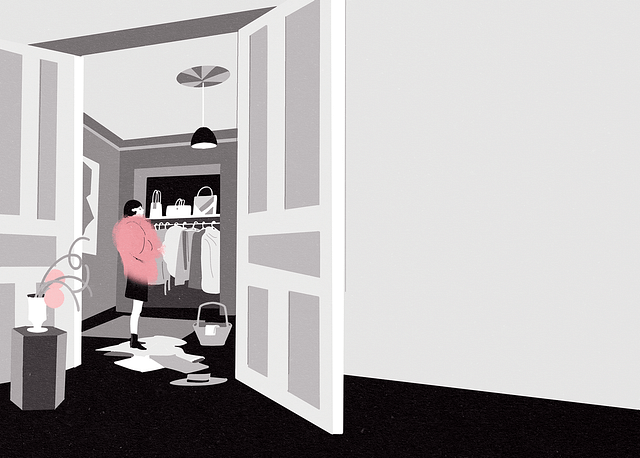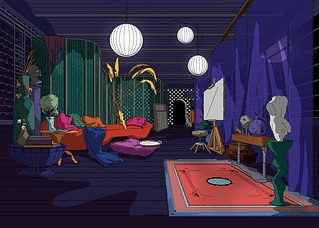
I clean house for Susan. She lives in that fancy thing on top of the hill.It has six bedrooms and each of those bedrooms has its own private bath. Two of them have both — a bath and a shower. Why someone needs two of those things, I couldn’t tell you. Having one is good enough for me.
Susan likes for me to come work for her on Thursdays. It’s just before the weekend but also before Friday, and she wants her place to be ready for guests. She always tells me they like to drop by, her friends, her children, people from work — when she used to work, that is. She doesn’t work anymore, she tells me. She got to retire early, she says.
You walk into Susan’s house and you think the place is a museum. It’s quiet. There’s something about it that looks to me like it’s not lived in. Her home is spotless. Susan’s traveled all over, and she has souvenirs — little trinkets, little boxes, and figurines. Her walls are covered with paintings, and photographs of her family. Even when she’s away, vacationing somewhere, she still wants me to come by, to dust at least.
Most of the others I clean for have me come by when they aren’t home. They give me the security code to disable the alarm, or a copy of their keys. They spend the day at the spa, at work, with friends, and wherever, really, just not at their home. I like that, working all by myself, going at my own pace. No one looking at me, asking me personal questions. I sometimes get done early, and when that happens and no one’s around, I put up my feet and just look at the ceiling.
I can’t do that when I clean for Susan. She’s there with me, down on her knees. She has her own cart, her own spray bottles, scrubs, shines, oils, polishes, vinegars. If you ask me, one thing is enough. I recommend dishwashing soap. It can be used to clean and wash anything. It’s cheap, and it’s easy to find even at a corner store. If you ask me, Susan cleans better than I do. I honestly don’t know why she hires me.
I tell Susan, I am happy to do this all myself. She should go do whatever she needs to get done. But she feels guilty leaving all of this to me, she says.I tell her, Well, that’s what you pay me for. No need to feel anything about that. But she insists.
Susan has a closet the size of my whole place. It’s just for her shoes and purses, clothes and jewelry. She likes to take these items from their drawers and boxes and tell me to feel them. I go along with it all. It seems important to Susan that someone is impressed with the things she can get with her money, to be up close to what her money has brought her. She reminds me a little of kids who take out all their toys and play with them all at once. One thing just isn’t enough.
She has a dog named Handsome, a schnauzer. He’s only a few years old, and she hasn’t really potty trained him. For some reason, he likes to do his business in the pool. She thinks it’s funny, and stands by with a net to scoop it out when he’s done. He’s spoiled, if you ask me. I admit the little creature is cute, with a name like that, and eyebrows that take up half of his face. He’s the first to greet me every time I come here.
Susan likes to talk about her daughters. One lives in New York, and the other lives in Washington, D.C. They all look like Susan. Blond hair and blue eyes, petite. Susan had her oldest one when she was just out of high school. She married her high school sweetheart. I haven’t met her husband, but I feel like I have. She talks about him a lot. I guess when you have those things — grandchildren, children, and a husband — you talk about them, bring them into conversations, and let people know you have them.
Every time we dust those photographs of all of them on vacation in the hallway, Susan tells me something new. Where they ate, the hotels they stayed in, the goofy and loving things only family know about. After a while, I notice Susan isn’t in any of the photographs. “Well, you know, it’s a mother’s job to take all the photos and have a record of all the memories we have as a family.” She pauses. “But you wouldn’t know about anything like that, would you.”
It seems to me no one likes to be alone or talk about being alone. I’m alone. I don’t talk about it too much. It makes people uncomfortable, depresses them. They feel sorry for you is what it is. Or they start to imagine what that might be like, and can’t honestly remember a time when they were alone. Or they think you have designs on what they have.
I don’t, of course, have any designs on anyone, and I haven’t got respect for anyone who does. I know some people think affairs are romantic. They seem to think it says something about their love, its power. A few years later, after the two have been together, they start thinking about the feelings of the person they left behind. And how it might now happen to them, too. I don’t know, you know. How great is someone — or their love, really — if you can peel them away from someone else? Anyway, Susan thinks I should do something about this, this being alone thing. It’s unnatural, she says.
Susan thinks I’m not so bright. She doesn’t say this to me, of course. She is a woman of manners. She speaks to me real slow, makes sure all the letters of words are pronounced. I understand perfectly what she means, but I don’t want to embarrass her, so I just go along with it. It makes her feel good, being so nice and all. She gives the most generous of tips. And I always remember to thank her. She likes that kind of thing. Saying thanks, not just once or in the moment but several times, even months after. She likes this especially when she gives me the Christmas bonus. She’ll sometimes ask what I did with it, the bonus, as if the money were hers and on loan.
Sometimes when we’re cleaning, she’ll tell me how to clean like I don’t already know. I don’t want her to feel bad, because she pays me and all, so I say, “Oh. Is that right?” Or, “You don’t say. Look at that. It is better
this way.” She likes compliments, and when I give her one, she hops and jiggles like Handsome when he’s had a treat.
This past week, I forgot my purse at Susan’s house. I left it on the table in the kitchen. I can still see it in my mind now, thinking of it. I drove down that hill, out of that long, winding driveway, and had driven about fifteen minutes when I realized the purse was there, at the house. I didn’t want to get caught driving without my license again. I need my car. There aren’t any bus routes in this town. You either walk or you drive, and maybe you can bike. But a grown-ass person biking someplace in this town is a sorry sight. I didn’t want to be that. So I turned around, drove back up that hill. I wasn’t far.
When I parked my car where I always did, I saw a pickup truck there. The license plate was real easy to remember. RICH. Below it dangled a rubber attachment of plastic testicles. It took me a while to put it together. It meant the driver was a man. And he wanted you to know about that. I supposed this was Susan’s husband. This catch.
I walked to the door closest to me and turned the handle, and it was open. I made my way to the kitchen and there was my purse. A man was in the kitchen, drinking milk right out of the carton. He drank it like a beer. Large gulps. He looked like the man in the photographs in the hallway. This must be Susan’s husband, I thought. He noticed me standing there, and he said, “Left your purse, did you? It’s right there.” He pointed.
I picked up my purse, fixed the strap on my shoulder. Then he said, “You’re Susan’s little friend, huh? The one who comes up here on Thursdays to help her.”
I nodded.
You can’t get too chatty with these people. They get uncomfortable having to stoop to talk to you. Plus, I didn’t want to be alone with him. Susan would be quick to accuse me of having designs on her man, so I headed for the exit.
I had just started on my way when he said, “If you’re looking for our girl, she’s out there, in the pool house.” He pointed outside. It was a small little brick building. It looked like it fit only a toilet. I thought he was joking. One of those husband types who like to make jokes to belittle his wife. The dumber the joke, the stronger the proof of how deep their love is, because he can get away with it. I didn’t think anything beyond that and just made my way out.
I didn’t want Susan to see me there, seeing her family at home. I ducked behind a small bush and made my way to my car. Then I heard the man, the man Susan said was her husband, say, “Fetch it, Susan! Fetch it!” There was laughter besides his. Small children, another woman. I could hear Handsome barking away, too, joining their noise. I walked back to see what it was. Who these people were. Why they were talking to Susan that way.
I saw Susan. She was in the pool, neck-deep, paddling in the water toward a small dark lump floating on the surface. It looked like a piece of tamarind. She took it with her bare hand and swam back to the shallow end. She went into the pool house with it. I looked at the people there. I had seen them before in the photographs of the house. Those kids there, Susan said were her grandchildren. That woman there, she said was her daughter. The man, Susan said was her husband — the one she married right out of high school. But the way those two were touching each other now, and at it, even in front of the children, seemed to me like they weren’t father and daughter. I didn’t know what this was. I was still thinking of Susan. Susan. Susan swam in there and fetched. Fetched. As they told her.
The next day, my boss told me Susan had called and said they wouldn’t be needing my services anymore. Said I wasn’t doing a good job cleaning, that I didn’t show up when I said I would. I was going to march up to the top of that hill, find Susan in her pool house, and tell her I knew exactly who she was, so she’d better not be saying stuff about me. I know filth when I see it, and I know what to do about it, too. But I kept thinking of that turd. Floating on the water. Susan’s white hand and polished fingernails fetching it. And that plastic sack hanging from the pickup truck. The stories she told me, what she’d said of herself and pretended to be all this time. Telling me it was unnatural to be alone, how I had to do something about that. Some people. You think you know them, and then you see them once, in their truth. Once is good enough for me.


